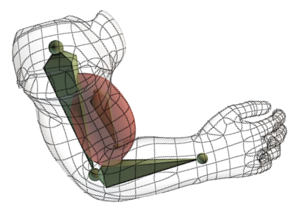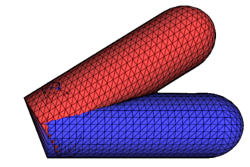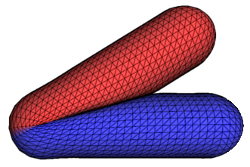[SIGGRAPH ASIA] Elastic Implicit Skinning

Elastic Implicit Skinning: a Robust Iso-Surface Tracking for Interactive Character Skinning
Publication: ACM SIGGRAPH ASIA, 2014
Rodolphe Vaillant1,2, Gaël Guennebaud3, Loïc Barthe1, Brian Wyvill2, Marie-Paule Cani4
1IRIT - Université de Toulouse, 2University of Victoria, 3Inria Bordeaux,
4LJK - Grenoble Universités - Inria

Comparison of Implicit Skinning with our new Elastic Implicit Skinning. From right to left: Jeff in T-pose, Jeff rigged with implicit skinning, Jeff rigged with elastic implicit skinning, female model with implicit skinning then elastic implicit skinning.
With elastic implicit skinning the skin stretches automatically (without skinning weights) and the vertices distribution is more pleasing (notice the belly button stretch). Our approach is more robust, for instance the angle's range of joints is larger than implicit skinning (notice the triangle inversion of implicit skinning at the knee joint)
 |
 |
 |
| (b) | (c) | (d) |
| (b) Artists can safely add additional shapes to simulate muscle bulge. (c) Implicit skinning fails when applied over a rigid skinning (i.e. skinning weights are either 0 or 1). (d) Elastic implicit skinning automatically distributes the vertices: no skinning weights required! Only mesh partitioning. | ||
Summary
We present elastic implicit skinning, a novel approach for interactive character skinning. The method simulates skin contacts between limbs as well as the effect of skin elasticity. In addition, we go a step further towards the automation of the rigging process: our method doesn't require the definition of skinning weights.
Elastic implicit skinning takes the best features of the recent implicit skinning method, and makes it robust to extreme character movements. While keeping the idea of implicit skinning, namely approximate the character by 3D scalar fields in which mesh-vertices are appropriately re-projected, we depart from the processing pipeline used so far. Implicit skinning is history independent and use an initial skinning solution (e.g. linear blending or dual quaternions) to correct vertex positions at each frame. Our approach is history dependent, the mesh directly tracks the iso-surfaces of the scalar field over time.
Technically our solutions include: new implicit surface composition operators and a tangential relaxation scheme derived from the as-rigid-as possible energy.
[ ![]() Paper 21MB ]
Paper 21MB ]
Video
[ ![]() HD video file 243MB ] [
HD video file 243MB ] [ ![]() captions ] [
captions ] [ ![]() Play on YouTube ]
Play on YouTube ]
Presentation
[ ![]() Talk slides ] (ppt 2013 and script embeded in notes)
Talk slides ] (ppt 2013 and script embeded in notes)
Figures
Need to use some figures from our paper? go ahead:
Acknowledgments
We thank artists, companies and universities who provided us with nice 3D models and animations.
Laura Paiardini (http://laurapaiardini.rd-h.fr/)
from Inria Grenoble provided us with the skeleton animation of the Armadillo
and Garrett Pond from Brigham Young University (BYU) who modeled the Jeff model
which is the big guy from the short movie 'Owned'.
Finally the famous armadillo model comes from the Standford university 3D scan repository.
We also thank the blender foundation as 90% of our renderings are done with Blender
with either the "cycle renderer" or the "internal renderer".
This work has been partially funded by the IM&M project (ANR-11-JS02-007)
and the advanced grant EXPRESSIVE from the European Research council.
Partial funding also comes from the Natural Sciences and Engineering Research Council of Canada, the GRAND NCE, Canada and Intel Corps.
Finally, this work received partial support from the Royal Society Wolfson Research Merit Award.
Related links: Implicit Skinning project Implicit Skinning on blender 1 Implicit Skinning at SIGGRAPH 2013 Implicit Skinning artist debate Implicit Skinning raise Ton Roosendaal interest Implicit Skinning requested in 3d Studio Max
four comments
 Donate
Donate
Absolutely amazing! This is a revolution!
Roberto Locatelli - 23/10/2014 -- 22:01